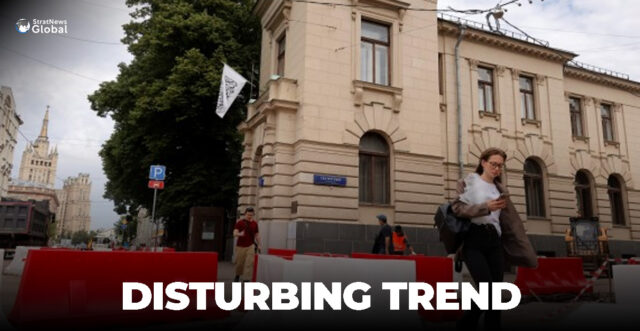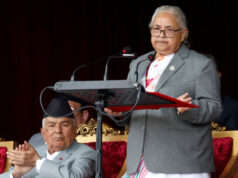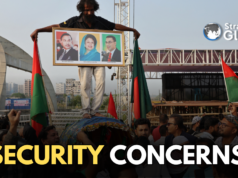Is India’s abstention from the recent UN General Assembly resolution on Afghanistan part of a disturbing trend of violent, extremist regimes quietly gaining global legitimacy?
New Delhi’s decision came just days after Moscow formally recognised the Islamic Emirate of Afghanistan on July 3, making Russia the first country to grant the Taliban full diplomatic recognition since their return to power in 2021.
This follows Russia’s April move to lift its two-decade-old ban on the Taliban as a terrorist organisation.
The UNGA Resolution, which urged Kabul to end the “grave, worsening, widespread and systematic oppression” of women, children and minorities and take decisive action against terrorism, was passed as a draft with 116 votes in favour, two against (US and Israel) and 12 abstentions, including India, Russia and China.
“An approach focused only on punitive measures, in our view, is unlikely to succeed,” explained India’s permanent representative to the U.N. Parvathaneni Harish.
While Russia had maintained diplomatic and intelligence ties with the Taliban for some time, this full endorsement removes any pretence of hesitation.
The Kremlin says it’s a matter of pragmatism: the Taliban are in control, are fighting ISIS-K, and are maintaining order.
But what Moscow has handed the Taliban is far more than a trade deal or diplomatic handshake. It is the one thing the group has craved and lacked: international legitimacy. Which grants access to global finance, bilateral agreements, and eventually, a seat at major international forums.
“Thanks to this formal recognition, Russia is strengthening its economic ties with Afghanistan, aiming to become a major supplier and partner,” says Giuliano Bifolchi, Italian intelligence analyst and co-founder of SpecialEurasia.
Russia is reportedly seeking to expand trade in oil, gas, and wheat, and collaborate with the Taliban on energy, infrastructure, and agriculture. This could place Moscow in direct competition with China, which has long subsidised the Taliban in exchange for access to Afghanistan’s mineral wealth, he adds.
Of course, geopolitical interests have always overshadowed human rights. But there was once a red line: a designated terrorist group that seized power through violence was not granted formal recognition. That line is blurring, fast.
In March 2025, the United States quietly removed three senior Haqqani Network leaders from its “Rewards for Justice” program—including Sirajuddin Haqqani, now the Taliban regime’s acting Interior Minister. The Haqqani Network, one of the most brutal factions within the Taliban, is responsible for numerous attacks on civilians and diplomats, including two deadly bombings targeting India’s embassy in Kabul in 2008 and 2009. The July 2008 attack killed 59 people, including four Indian officials. Today, the Haqqanis are a part of the regime in Kabul.
Despite this, India—once a strong backer of a democratic Afghanistan—has been tiptoeing toward a more open engagement with the Taliban.
Afghanistan was among the first to condemn Pakistan for the recent terror attack in Pahalgam, and India earlier allowed a Taliban-linked, India-educated representative to head the Afghan consulate in Mumbai. These are signals, however cautious, of deepening ties that may eventually pave the way for formal recognition.
But this is no longer just about Afghanistan or Russia. Globally, regimes run by militants or designated terrorists are slowly acquiring the sheen of normalcy.
Syria’s Bashar al-Assad, once a global pariah, has been readmitted into the Arab League. The United States and European governments have dialled down opposition to groups like Hay’at Tahrir al-Sham (HTS), an Al Qaeda offshoot now entrenched in northwest Syria.
What’s emerging is a new playbook for power: if you can seize territory, maintain a semblance of order, and offer geopolitical value, particularly in counterterrorism or trade, your past can be papered over. Recognition becomes a question of time, not conduct.
That sets a disastrous precedent. If the Taliban—whose rule is marked by repression, gender apartheid, and elimination of civil liberties—can win international recognition, what’s to stop other armed groups from believing they can do the same? Why negotiate or engage in dialogue when power can be taken by force and eventually rewarded?
It also abandons those suffering under these regimes. Afghan women have been erased from public life. Journalists are jailed, protests crushed. Recognising the Taliban without demanding any measurable change is a brutal betrayal of the millions of Afghans who once believed the world stood with them.
None of this is to argue for isolation. Afghanistan is in humanitarian freefall. Millions need aid. Engagement is essential. But there’s a line between delivering food and medicine and handing power and legitimacy to a regime that has shown nothing but contempt for human rights.
The real danger is what happens next. When legitimacy is decoupled from democratic process and basic human dignity, and tethered instead to strategic convenience, the signal is clear: violence works. Just hold on long enough, and someone will come calling.
We’ve already seen where this logic leads in parts of Africa, in Syria, and now in Afghanistan. It breeds unaccountable regimes and extinguishes hopes for more open, representative governance.
Russia’s recognition of the Taliban may seem like a footnote in a complicated region. It’s not. It’s a marker of the world we’re drifting into: where legitimacy is seized, not earned.
In a career spanning three decades and counting, Ramananda (Ram to his friends) has been the foreign editor of The Telegraph, Outlook Magazine and the New Indian Express. He helped set up rediff.com’s editorial operations in San Jose and New York, helmed sify.com, and was the founder editor of India.com.
His work has featured in national and international publications like the Al Jazeera Centre for Studies, Global Times and Ashahi Shimbun. But his one constant over all these years, he says, has been the attempt to understand rising India’s place in the world.
He can rustle up a mean salad, his oil-less pepper chicken is to die for, and all it takes is some beer and rhythm and blues to rock his soul.
Talk to him about foreign and strategic affairs, media, South Asia, China, and of course India.





